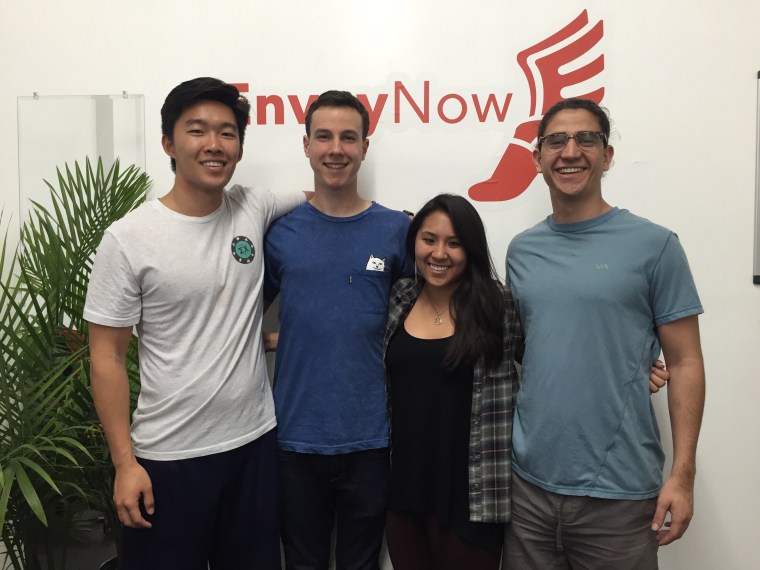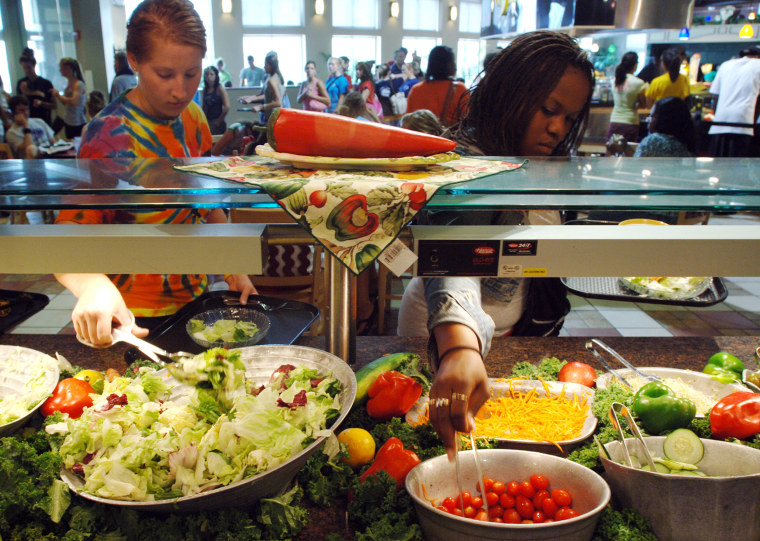When Anthony Zhang and Chad Massura entered their freshman year at the University of Southern California, they faced cravings that college students who stay up late studying and chatting with friends know all too well: the late-night munchies.
But living on a campus that closes its gates at 9 p.m. meant the roommates’ options were limited to what their dorm’s vending machines had to offer, or university cafes that often just weren't worth the hike.
While typical restaurants couldn't access school grounds after the gates closed, Zhang and Massura realized as students, they could get anywhere on campus — including libraries, dorms, and lecture halls where outside deliverymen aren't ever able to get to directly.
Special section: Get tips and advice about college at College Game Plan
After partnering with two other freshmen, Nick Wang and Gabriel Quintela, the students decided to fill the gap in the market through EnvoyNow, a student-to-student food delivery company launched in April 2014. Via a mobile app, students can order from restaurants within a 1.5- to 2-mile radius from the center of campus, and for a $2.99 delivery fee, student “envoys” will bring their food anywhere so they never have to leave their library table.

“When we hire students, not only are we giving a lot of job opportunities for the college environment — it’s given $150,000 back into students’ pockets just last semester — but we are also allowing for a much more convenient delivery for students,” Quintela, now a USC senior, told NBC News.
The public relations major and EnvoyNow COO said students are paid on commission, typically making $13 per hour.
Although EnvoyNow quickly captured attention across USC with the help of student publications, getting into Silicon Valley-based venture capital seed fund 500 Startups last summer allowed the team to grow nationally.
Since it launched, the company has expanded to 20 campuses, including the University of North Carolina and the University of Michigan.
Related: Harvard Student's App Solves One of Uber's Biggest Flaws
Rising University of Michigan junior Wynona Bautista said the app has been well-received, especially because of its flat delivery fee.
“EnvoyNow advocates for servicing college students by using college students itself,” Bautista told NBC News. “A lot of us are on a budget and we don’t want to see those markups from other delivery services.”
Increased success across campuses, however, also means an increase in the number of obligations the college students are juggling.
“You do sacrifice a little bit as a college student. You don’t get to go out as much, there’s a couple times where your friends are doing things that you don’t necessarily get to go along with,” Quintela, who typically spends eight hours on EnvoyNow and two hours on school work each day, said.
EnvoyNow Chief Technology Officer and recent USC graduate Parker Seagren said he always put the business first, treating it as his full-time job. He believes working on the business made his college experience more fulfilling.
Related: Coder, 19, Builds Chatbot That Fights Parking Tickets
“I learned so much building this business, almost more than I did in a lot of my classes,” the computer science major told NBC News. “When you’re working with other college students, whether its campus managers, or the envoys ... [or] other developers — since everyone in the company is a college student, I made a lot of meaningful relationships.”
Starting EnvoyNow in college not only provided the team with a potential customer base, but a supportive environment with resources not available in the professional world through teachers and mentors, Seagren said.
The company is now looking to grow on each campus in the fall, and then continue launching at more schools. Although the team is currently focusing on food delivery, they hope to eventually expand to meet all needs of college students — from dorm room supplies to laundry.
Quintela said that despite the challenges of starting a business while in school, he thinks hesitant college students should “just do it.”
“It’s very easy to convince yourself that whatever your idea is, or whatever you’re trying to go after as an entrepreneur, isn’t possible,” he said. “But you know, that is all left behind pretty quickly once you start acquiring users and after making some money. The environment we live in today, just tech-wise, is one where anyone can actually start a business.”
